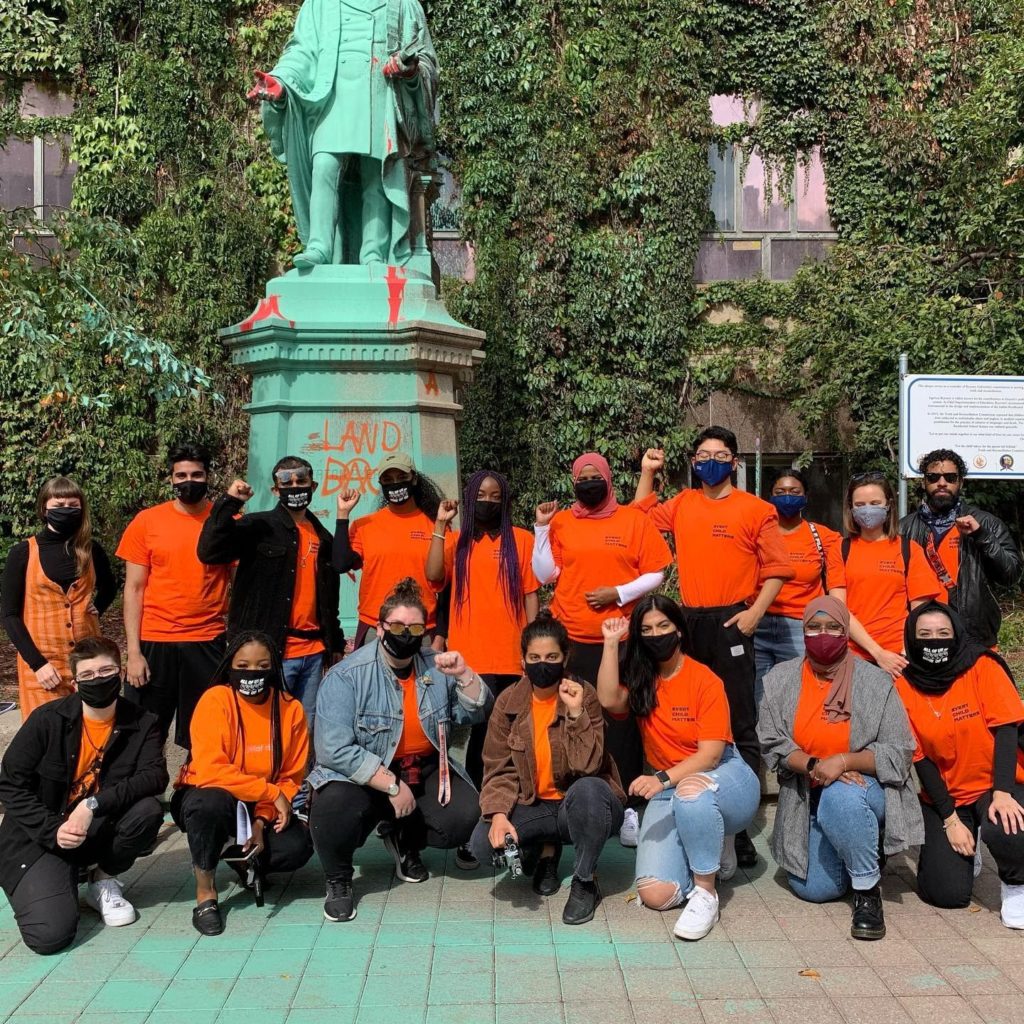All Out September 30th looks to hold post-secondary educational systems accountable

Organizers of the All Out September 30th strike held a press conference yesterday about the importance of holding institutions accountable for systemic racism. The event took place directly in front of the Egerton Ryerson statue that organizers are demanding be removed from Ryerson University’s campus.
The All Out September 30th strike taking place today is meant to call attention to anti-Black and anti-Indigenous racism. It is organized by Black, Indigenous, racialized and allied leaders from various associations and unions across the Greater Toronto Area.
At yesterday’s conference, three representatives of the organization said Black, Indigenous and racialized students are under attack by post-secondary education systems.
“Our violent, colonial histories on this land are the foundations on which the anti-Indigenous and anti-Black policies, which govern and guide our educational systems, were built on,” Kien Saningong Azinwi, president of the York Federation of Students and one of the organizers of the event, said at the conference.
Without Canada’s “colonial genocidal history,” Azinwi said these oppressive post-secondary institutions would not exist. She said many universities release statements saying they support Black and Indigenous students but are not taking action to dismantle and reconstruct their systems.
“We are tired of indulging a system and institutions that hide behind buzz words of diversity, equity and inclusion, while fundamentally not understanding their meaning or the actions that come with them,” Azinwi said. “These words have become simple excuses to not address the prevalent issues of racism, and (are) used as scapegoats to avoid real work.”
Another speaker at the event, Nenookaasi Ogichidaa, said the Ryerson statue serves as a reminder of how Indigenous people are truly valued: “not at all.”
“You say you want to be an ally, but take no accountability in the fact that you are an accomplice,” she said, speaking about Ryerson University. “(This is) a school built upon colonial views and named after a man who has brought nothing but humiliation to many nations.”
The organizers also expressed disappointment at the Egerton Ryerson statue not yet being removed from campus. They say the existence of the statue is hurtful and only glorifies Ryerson’s role in Canada’s residential school system. In 1847, Ryerson was commissioned to write a report on “Industrial schools.” His report includes descriptions of the average Indigenous person as requiring “religious feeling” to “elevate his character and condition.” Ryerson wrote that “this influence must be superadded to all others to make the Indian a sober and industrious man.”
On Sept. 2, Ryerson University announced a task force to address Ryerson’s history and to make suggestions on how to reconcile his legacy with the university.
Compulsory attendance at industrial schools and residential schools was made mandatory with an amendment to the Indian Act in 1894. The system removed thousands of Indigenous children from their families and stripped them of their culture. Beverley McLachlin, then the chief justice of the Supreme Court of Canada, called the residential school system “cultural genocide” in 2015.
Today’s All Out September 30th strike is a virtual event being held from 11 a.m. to 7 p.m. The strike will begin with opening remarks and an Orange Shirt Day teach-in. Orange Shirt Day, which is held annually on Sept. 30, honours the healing process of residential school survivors and their families and commits to reconciliation.
At 1 p.m, strike organizers held a series of webinars discussing the importance of defunding the police, followed by a discussion of the barriers Indigenous and Black students face in education.
At 4 p.m. they will hold a webinar and town hall discussion on racism in classrooms, discussing the experiences of Black and Indigenous students, staff, and faculty both in and outside of the classroom.
